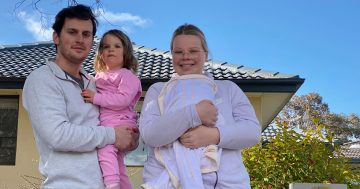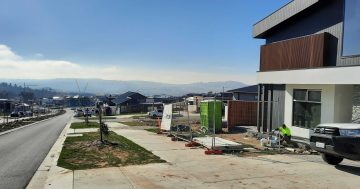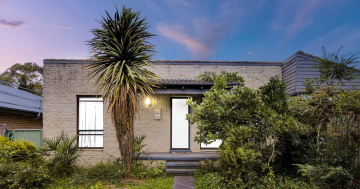
All young people need to do is to stop brunching on smashed avocados, and then put that money into the new First Home Buyer Scheme, and they will be set, right? I decided to do some investigation to find out a little bit more about first home buyers in Canberra.
How much does it cost to buy a house in Canberra?
In Australia, the average house price is now at least $656,800. Canberra has the third most expensive average house prices, with the median price $642,000. Now of course not all first home buyers will buy a house – some will look to buy an apartment or a cheaper property, but even then there is a lack of low-cost options.
To buy a home, you need at least a 5 per cent deposit, plus you need to factor in costs like stamp duty, legal fees, removal costs and then future costs like renovations, rates, insurance and strata fees (if a unit). So realistically to buy a house at the medium range you are going to need $32,840 at a minimum with a more likely figure of around $60,000 or more.
And ideally, a first home buyer needs at least a 20% deposit to avoid lender’s mortgage insurance. If you are wondering what this is, this is something levelled to protect the lender against potential defaults – it does not ensure the borrower if he/she is unable to pay a mortgage, but it is the borrower – not the lender – who has to pay it.
In the May Federal Budget, the Treasurer announced a new First Home Super Saving Scheme to encourage young people to buy into the market. He also announced a scheme to encourage older people to downsize.
I personally dislike any policy that tries to pit one generation against another. An older person (or couple) could just as easily be a first home buyer. He/she/they might be migrants, for instance, or maybe lower income and it has taken them a long time to save. Or maybe they invested in the stock market instead before deciding to invest in home ownership. The point is, not all first home buyers are young people. Further, not all first home buyers will buy the properties that older people are being encouraged to sell to downsize. But this scheme is a good start.
The new savings scheme put forward by the Treasurer is a result of the intense public debate about the housing crisis and, in particular, the disadvantage that many young people face in entering the market. One suggestion to improve affordability was to allow young people to access their superannuation to make a deposit. The scheme that was announced is in response to this debate. I asked Michael Miller from MLC Advice Canberra how it works.
According to Michael, details of the scheme are yet to be finalised. That said key details have been released by the Government:
- Starting from 1 July this year, first home buyers who have made voluntary contributions to their super will be able to withdraw their voluntary contributions to put towards a home deposit. The key point here is ‘voluntary’. This means first home buyers can’t touch any ‘compulsory’ contributions, but only anything additional they have contributed.
- You can salary sacrifice into the first home buyers scheme. Contributions are taxed at 15%, unless you have earnings higher than $250,000. This is a tax effective way to make contributions, because otherwise your earnings would be taxed at a much higher rate. According to Michael, for many first home savers this would offer good tax incentives such as in this example:
If your salary is $60,000 a year, and you salary sacrifice $10,000 of that into a super account, it will be taxed at 15% and you’ll have $8,500 saved in the account. If you receive it as salary, that $10,000 will be taxed at 34.5% (including Medicare levy at the current level), leaving you with $6,550 to add to your savings. That’s an extra $1,950 saved under the super contribution option.
- A first home buyer can only add up to $15,000 in a financial year, and cannot add more than $30,000 in total to the first home buyer scheme. The real amount a first home buyer can contribute is actually less – this is because contributions are also subject to a concessional contribution cap of $25,000 per financial year, which includes both compulsory employer contributions and any voluntary contributions. So a first home buyer in a high paying job could be limited in the amount he/she could contribute.
- Got your eye on a property that you want? You’d better slow down because you are not able to withdraw any money from the account until 1 July 2018. When you do withdraw the money, it will be subject to income tax but will have a 30% tax offset.
According to Michael, for most first home buyers, superannuation will become the most tax effective place to start saving for a home deposit. There is a calculator on the Budget website that provides an indication of whether the scheme might work for you or not.
The big question is will first home owners use the scheme? The Government’s previous attempt to encourage savings via the First Home Saver Accounts were unsuccessful, and they were abolished effective 1 July 2015. Under the scheme the government provided 17% for donations up to $60,000 – but first home buyers could not use the funds for four years, which obligated them to a long-term and inflexible savings regime. Most first home buyers I spoke with felt that the restrictions were not worth it for them.
Since I already have my own bachelorette + kidlets pad, I approached a friend, who is a competent, upwardly mobile student at ANU, to ask her views about the new scheme. She had made some online comments about it being increasingly difficult for young people to break into the housing market, so I knew she would have strong views.
“Well, I think $30,000 is not enough when you consider the median house prices in Canberra,” she said. “I guess I could combine with a guy, but I have enough trouble dating as it is – no men want to talk about settling down and buying a house. I want to follow your example and be independent and a boss at financial management. At the moment, I am working two jobs and studying full time. It’s hard to even think about saving money when up to two-thirds of my income goes on rent. But when I get to that stage, I think this scheme is something I would use.”
Now that she mentions it, anecdotally I have noticed that my younger girlfriends have tended to be more savvy with getting into the property market as opposed to my male friends – a new trend or just representative of the fiscally aware company that I keep? How does that impact on the more traditional view of a couple buying their first home as they get married? I don’t think this has been fully thought of with this model.
I think there are some good features about the First Home Buyers Scheme and it a good start. But with rising property prices and a declining job market, it will probably fall short for many Canberra first time home buyers.
Do you think it is easy for first home buyers to break into the Canberra property scheme? Do you think the First Home Super Saving Scheme will be useful to help first home buyers achieve their dream of home ownership?





















